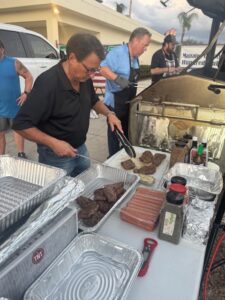Florida’s sunshine is part of what makes our state so special—but for law enforcement officers, the relentless heat can pose serious challenges. With high humidity and temperatures often soaring well into the 90s and beyond, the heat isn’t just uncomfortable—it can have real implications for the safety, performance, and well-being of those who protect and serve our communities.
The Physical Toll on Officers
Wearing a full-duty uniform, including a ballistic vest, utility belt, and often additional gear, makes staying cool a constant battle. The added weight and lack of ventilation increase body temperature and place officers at higher risk for:
Heat exhaustion and heat stroke: These can occur quickly, especially during long shifts outdoors or while responding to emergencies in full gear.
Dehydration: Staying hydrated is critical, yet officers may go hours without access to water, especially during incidents or prolonged assignments.
Fatigue and reduced stamina: High temperatures can drain physical energy faster, affecting alertness and decision-making.
Impact on Law Enforcement Duties
Extreme heat doesn’t just affect the body—it impacts how law enforcement carries out its duties:
Traffic stops and patrols: Working on asphalt, which radiates heat, intensifies exposure. Vehicle interiors can become dangerously hot quickly, even with air conditioning.
Search and rescue operations: Heat adds complexity and danger to physical exertion, increasing the urgency to monitor both officers and those being rescued.
Crowd control and events: Officers assigned to outdoor events or protests face added stress managing large groups in sweltering conditions, requiring careful planning and backup.
K-9 Units: Heat can be especially dangerous for working dogs, limiting how long they can safely be in the field. Departments must prioritize shade, hydration, and cooling options for their K-9 partners.
Staying Safe in the Sun
Departments across Florida take proactive measures to mitigate heat-related risks:
Implementing hydration protocols and mandatory cool-down breaks.
Equipping patrol cars with cooling vests or portable fans.
Providing training to recognize early signs of heat-related illnesses.
Rotating assignments to reduce extended heat exposure.
A Community That Cares
As community members, we can play a role too. A cold drink, a shaded area, or a simple word of appreciation can go a long way for officers on duty in the heat. Our law enforcement professionals give their all—rain or shine—and the summer months bring unique challenges that deserve both our respect and support.
Author
-

Manatee Hundred Club Board Member and Supporter of Law Enforcement.
View all posts
Local Business Owner - Secure HR, LLC and Bridgely Key Options, LLC
Secure HR, Bridgely Key





